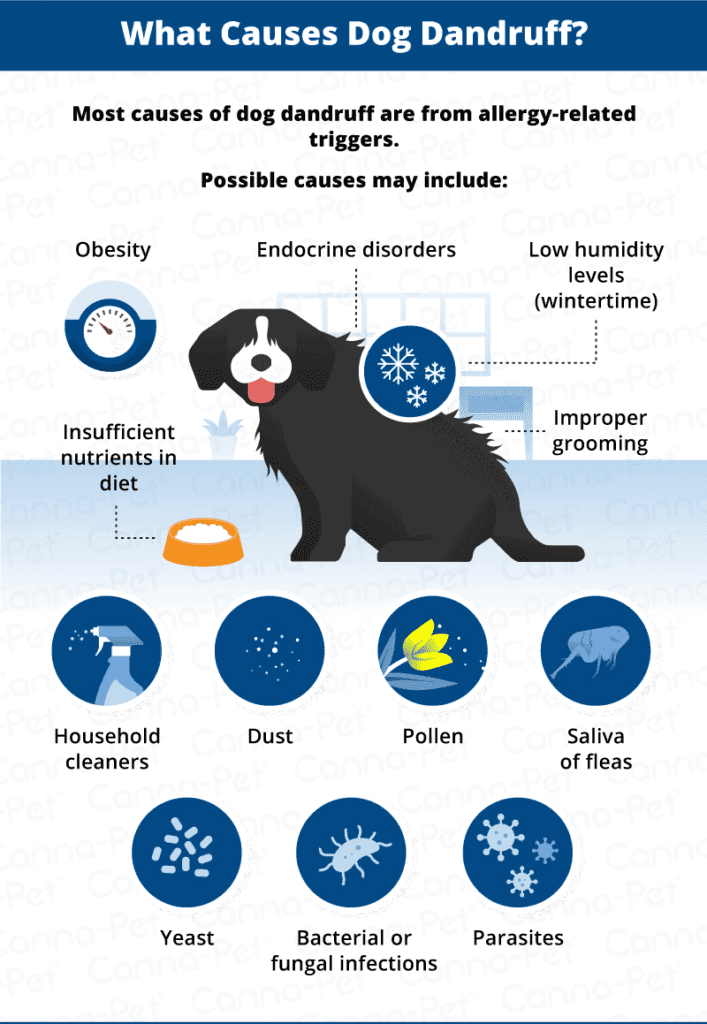Dandruff in dogs, much like in humans, is characterized by the shedding of dead skin cells. These flakes can accumulate on your dog’s coat, often becoming most noticeable on their back, particularly near the tail, and when you pet or scratch them. A dog’s skin produces oil, known as sebum, to maintain hydration and suppleness. However, an overproduction or imbalance of sebum can lead to seborrheic dermatitis, which can manifest as either dry (seborrhea sicca) or oily (seborrhea oleosa) dandruff.
Common Causes of Dandruff in Dogs
While any dog breed can experience dandruff, the causes can be varied, ranging from genetic predispositions to environmental factors and underlying health issues. Understanding these potential causes is crucial for effective management.
Environmental Factors
- Dry Environment: Just like humans, dogs can suffer from dry skin, especially during winter months when indoor heating can significantly reduce humidity. This lack of moisture in the air can lead to a flaky coat.
External and Internal Factors
- Parasites: Itchiness associated with dry skin can be exacerbated by external parasites. Mites, such as Cheyletiella mites, are sometimes referred to as “walking dandruff” because they are visible to the naked eye and resemble white flakes. If you observe movement within these flakes, immediate veterinary attention is necessary for parasite prevention and treatment, as some parasites can be transmitted to other pets.
- Poor Nutrition: An inadequate diet lacking essential nutrients can negatively impact your dog’s skin and coat health. Fatty acids, like omega-3s and omega-6s, are vital for maintaining healthy skin and hair. Consulting with your veterinarian is essential to determine the appropriate diet and potential nutritional supplements for your dog’s specific needs, considering their breed, age, lifestyle, and climate.
- Skin Infections: Bacterial and fungal infections can thrive on weakened or damaged skin, leading to dandruff. These underlying infections require professional veterinary diagnosis and treatment to resolve the flaking skin.
- Skin Allergies: Allergic reactions, whether to food or environmental allergens, often manifest as skin issues. Dogs with allergies may experience increased itchiness and flakiness, often accompanied by recurrent ear or skin infections.
- Hormonal Imbalances: Conditions such as Cushing’s disease or hypothyroidism can compromise a dog’s skin health and immune system, making them more vulnerable to secondary infections.
- Idiopathic Seborrhea: In some cases, the exact cause of a dog’s dandruff cannot be identified. This condition is termed “idiopathic seborrhea.” While the underlying cause may remain unknown, treatments can effectively manage the symptoms of dry, flaky skin. Your veterinarian can provide guidance on managing this condition.
When to Seek Veterinary Care
While mild or seasonal dandruff may not be a cause for major concern, it’s important to consult your veterinarian if your dog exhibits dry, flaky skin along with any of the following symptoms:
- Persistent itchiness
- Unpleasant skin odor
- Excessive dandruff
- Hair or fur loss
- Red, irritated skin
- Compulsive licking of paws or legs
- General signs of discomfort or illness
These symptoms, combined with your vet’s examination findings, will help determine the next steps, which may include diagnostic testing to identify underlying health problems, allergies, or parasites.
Home Care and Veterinary Treatments for Dog Dandruff
Fortunately, mild cases of dandruff can often be managed effectively at home with veterinary guidance.
At-Home Management Strategies
- Regular Grooming: Brushing your dog regularly helps to remove dead hair and excess oil, promoting healthy skin. Always consult your vet before using any grooming products.
- Bathing: Appropriate bathing can help manage dandruff outbreaks and skin infections. Your veterinarian may prescribe a medicated shampoo tailored to your dog’s condition. It is crucial to follow the instructions carefully and avoid over-bathing, which can worsen dry skin.
- Supplements: Nutritional supplements, particularly those containing fatty acids, can be beneficial. However, it is important to choose reputable brands and always seek your vet’s recommendation, as not all commercial supplements are heavily regulated for pets.
- Humidifier: Using a humidifier in your home, especially during dry winter months, can help alleviate dry skin for both your dog and your family.
When Professional Treatment is Necessary
If at-home strategies do not resolve your dog’s dandruff, a more complex underlying condition may be present. A veterinary examination is crucial to accurately diagnose and treat the issue, preventing your dog from unnecessary discomfort. Your vet may recommend further diagnostic tests, such as allergy testing, to pinpoint the root cause.
The treatment plan for your dog’s dandruff will depend on the severity of their condition and the identified underlying cause. For instance, addressing parasitic infestations requires specific anti-parasitic treatments, while hormonal issues need management through appropriate medication.
Disclaimer: This information is for educational purposes only and does not substitute professional veterinary advice. Always consult your veterinarian for an accurate diagnosis and treatment plan for your pet.
If you are concerned about your dog’s skin health, contact our Greensboro vets to schedule an examination for your canine companion.

